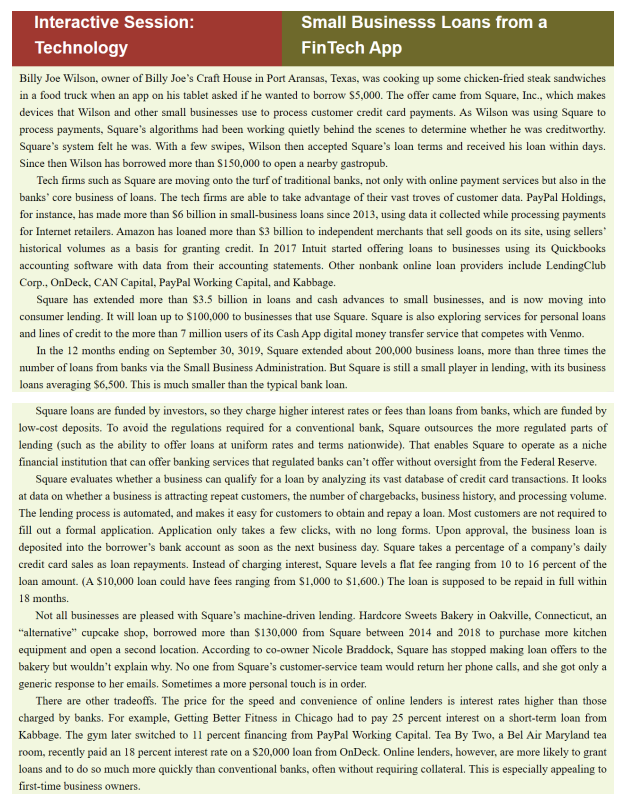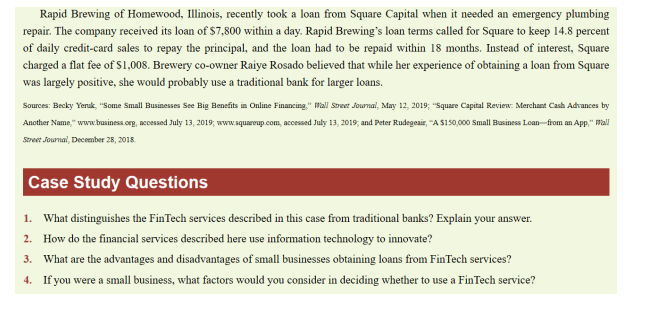Answered step by step
Verified Expert Solution
Question
1 Approved Answer
Technology FinTech App Billy Joe Wilson, owner of Billy Joe's Craft House in Port Aransas, Texas, was cooking up some chicken-fried steak sandwiches in a

 Technology FinTech App Billy Joe Wilson, owner of Billy Joe's Craft House in Port Aransas, Texas, was cooking up some chicken-fried steak sandwiches in a food truck when an app on his tablet asked if he wanted to borrow $5,000. The offer came from Square, Inc., which makes devices that Wilson and other small businesses use to process customer credit card payments. As Wilson was using Square to process payments, Square's algorithms had been working quietly behind the scenes to determine whether he was creditworthy. Square's system felt he was. With a few swipes, Wilson then accepted Square's loan terms and received his loan within days. Since then Wilson has borrowed more than $150,000 to open a nearby gastropub. Tech firms such as Square are moving onto the turf of traditional banks, not only with online payment services but also in the banks' core business of loans. The tech firms are able to take advantage of their vast troves of customer data. PayPal Holdings, for instance, has made more than \$6 billion in small-business loans since 2013, using data it collected while processing payments for Internet retailers. Amazon has loaned more than \$3 billion to independent merchants that sell goods on its site, using sellers' historical volumes as a basis for granting credit. In 2017 Intuit started offering loans to businesses using its Quickbooks accounting software with data from their accounting statements. Other nonbank online loan providers include LendingClub Corp., OnDeck, CAN Capital, PayPal Working Capital, and Kabbage. Square has extended more than $3.5 billion in loans and cash advances to small businesses, and is now moving into consumer lending. It will loan up to $100,000 to businesses that use Square. Square is also exploring services for personal loans and lines of credit to the more than 7 million users of its Cash App digital money transfer service that competes with Venmo. In the 12 months ending on September 30, 3019, Square extended about 200,000 business loans, more than three times the number of loans from banks via the Small Business Administration. But Square is still a small player in lending, with its business loans averaging $6,500. This is much smaller than the typical bank loan. Square loans are funded by investors, so they charge higher interest rates or fees than loans from banks, which are funded by low-cost deposits. To avoid the regulations required for a conventional bank, Square outsources the more regulated parts of lending (such as the ability to offer loans at uniform rates and terms nationwide). That enables Square to operate as a niche financial institution that can offer banking services that regulated banks can't offer without oversight from the Federal Reserve. Square evaluates whether a business can qualify for a loan by analyzing its vast database of credit card transactions. It looks at data on whether a business is attracting repeat customers, the number of chargebacks, business history, and processing volume. The lending process is automated, and makes it easy for customers to obtain and repay a loan. Most customers are not required to fill out a formal application. Application only takes a few clicks, with no long forms. Upon approval, the business loan is deposited into the borrower's bank account as soon as the next business day. Square takes a percentage of a company's daily credit card sales as loan repayments. Instead of charging interest, Square levels a flat fee ranging from 10 to 16 percent of the loan amount. (A $10,000 loan could have fees ranging from $1,000 to $1,600.) The loan is supposed to be repaid in full within 18 months. Not all businesses are pleased with Square's machine-driven lending. Hardcore Sweets Bakery in Oakville, Connecticut, an "alternative" cupcake shop, borrowed more than $130,000 from Square between 2014 and 2018 to purchase more kitchen equipment and open a second location. According to co-owner Nicole Braddock, Square has stopped making loan offers to the bakery but wouldn't explain why. No one from Square's customer-service team would return her phone calls, and she got only a generic response to her emails. Sometimes a more personal touch is in order. There are other tradeoffs. The price for the speed and convenience of online lenders is interest rates higher than those charged by banks. For example, Getting Better Fitness in Chicago had to pay 25 percent interest on a short-term loan from Kabbage. The gym later switched to 11 percent financing from PayPal Working Capital. Tea By Two, a Bel Air Maryland tea room, recently paid an 18 percent interest rate on a $20,000 loan from OnDeck. Online lenders, however, are more likely to grant loans and to do so much more quickly than conventional banks, often without requiring collateral. This is especially appealing to Rapid Brewing of Homewood, Illinois, recently took a loan from Square Capital when it needed an emergency plumbing repair. The company received its loan of $7,800 within a day. Rapid Brewing's loan terms called for Square to keep 14.8 percent of daily credit-card sales to repay the principal, and the loan had to be repaid within 18 months. Instead of interest, Square charged a flat fee of $1,008. Brewery co-owner Raiye Rosado believed that while her experience of obtaining a loan from Square was largely positive, she would probably use a traditional bank for larger loans. Sources: Becky Yeruk, "Some Small Businesses See Big Benefits in Online Financing," Wall Strest Journal, Mry 12, 2019; "Square Capital Review: Merchant Cash Adrances by Another Name," www business org, mcossed July 13, 2019; www. squareup com, acoessed July 13, 2019; and Peter Rudegeair, "A \$150,000 Small Business Loan-from an App," Wall Street Jounan', December 28,2018 Case Study Questions 1. What distinguishes the FinTech services described in this case from traditional banks? Explain your answer. 2. How do the financial services described here use information technology to innovate? 3. What are the advantages and disadvantages of small businesses obtaining loans from FinTech services? 4. If you were a small business, what factors would you consider in deciding whether to use a FinTech service
Technology FinTech App Billy Joe Wilson, owner of Billy Joe's Craft House in Port Aransas, Texas, was cooking up some chicken-fried steak sandwiches in a food truck when an app on his tablet asked if he wanted to borrow $5,000. The offer came from Square, Inc., which makes devices that Wilson and other small businesses use to process customer credit card payments. As Wilson was using Square to process payments, Square's algorithms had been working quietly behind the scenes to determine whether he was creditworthy. Square's system felt he was. With a few swipes, Wilson then accepted Square's loan terms and received his loan within days. Since then Wilson has borrowed more than $150,000 to open a nearby gastropub. Tech firms such as Square are moving onto the turf of traditional banks, not only with online payment services but also in the banks' core business of loans. The tech firms are able to take advantage of their vast troves of customer data. PayPal Holdings, for instance, has made more than \$6 billion in small-business loans since 2013, using data it collected while processing payments for Internet retailers. Amazon has loaned more than \$3 billion to independent merchants that sell goods on its site, using sellers' historical volumes as a basis for granting credit. In 2017 Intuit started offering loans to businesses using its Quickbooks accounting software with data from their accounting statements. Other nonbank online loan providers include LendingClub Corp., OnDeck, CAN Capital, PayPal Working Capital, and Kabbage. Square has extended more than $3.5 billion in loans and cash advances to small businesses, and is now moving into consumer lending. It will loan up to $100,000 to businesses that use Square. Square is also exploring services for personal loans and lines of credit to the more than 7 million users of its Cash App digital money transfer service that competes with Venmo. In the 12 months ending on September 30, 3019, Square extended about 200,000 business loans, more than three times the number of loans from banks via the Small Business Administration. But Square is still a small player in lending, with its business loans averaging $6,500. This is much smaller than the typical bank loan. Square loans are funded by investors, so they charge higher interest rates or fees than loans from banks, which are funded by low-cost deposits. To avoid the regulations required for a conventional bank, Square outsources the more regulated parts of lending (such as the ability to offer loans at uniform rates and terms nationwide). That enables Square to operate as a niche financial institution that can offer banking services that regulated banks can't offer without oversight from the Federal Reserve. Square evaluates whether a business can qualify for a loan by analyzing its vast database of credit card transactions. It looks at data on whether a business is attracting repeat customers, the number of chargebacks, business history, and processing volume. The lending process is automated, and makes it easy for customers to obtain and repay a loan. Most customers are not required to fill out a formal application. Application only takes a few clicks, with no long forms. Upon approval, the business loan is deposited into the borrower's bank account as soon as the next business day. Square takes a percentage of a company's daily credit card sales as loan repayments. Instead of charging interest, Square levels a flat fee ranging from 10 to 16 percent of the loan amount. (A $10,000 loan could have fees ranging from $1,000 to $1,600.) The loan is supposed to be repaid in full within 18 months. Not all businesses are pleased with Square's machine-driven lending. Hardcore Sweets Bakery in Oakville, Connecticut, an "alternative" cupcake shop, borrowed more than $130,000 from Square between 2014 and 2018 to purchase more kitchen equipment and open a second location. According to co-owner Nicole Braddock, Square has stopped making loan offers to the bakery but wouldn't explain why. No one from Square's customer-service team would return her phone calls, and she got only a generic response to her emails. Sometimes a more personal touch is in order. There are other tradeoffs. The price for the speed and convenience of online lenders is interest rates higher than those charged by banks. For example, Getting Better Fitness in Chicago had to pay 25 percent interest on a short-term loan from Kabbage. The gym later switched to 11 percent financing from PayPal Working Capital. Tea By Two, a Bel Air Maryland tea room, recently paid an 18 percent interest rate on a $20,000 loan from OnDeck. Online lenders, however, are more likely to grant loans and to do so much more quickly than conventional banks, often without requiring collateral. This is especially appealing to Rapid Brewing of Homewood, Illinois, recently took a loan from Square Capital when it needed an emergency plumbing repair. The company received its loan of $7,800 within a day. Rapid Brewing's loan terms called for Square to keep 14.8 percent of daily credit-card sales to repay the principal, and the loan had to be repaid within 18 months. Instead of interest, Square charged a flat fee of $1,008. Brewery co-owner Raiye Rosado believed that while her experience of obtaining a loan from Square was largely positive, she would probably use a traditional bank for larger loans. Sources: Becky Yeruk, "Some Small Businesses See Big Benefits in Online Financing," Wall Strest Journal, Mry 12, 2019; "Square Capital Review: Merchant Cash Adrances by Another Name," www business org, mcossed July 13, 2019; www. squareup com, acoessed July 13, 2019; and Peter Rudegeair, "A \$150,000 Small Business Loan-from an App," Wall Street Jounan', December 28,2018 Case Study Questions 1. What distinguishes the FinTech services described in this case from traditional banks? Explain your answer. 2. How do the financial services described here use information technology to innovate? 3. What are the advantages and disadvantages of small businesses obtaining loans from FinTech services? 4. If you were a small business, what factors would you consider in deciding whether to use a FinTech service Step by Step Solution
There are 3 Steps involved in it
Step: 1

Get Instant Access to Expert-Tailored Solutions
See step-by-step solutions with expert insights and AI powered tools for academic success
Step: 2

Step: 3

Ace Your Homework with AI
Get the answers you need in no time with our AI-driven, step-by-step assistance
Get Started


